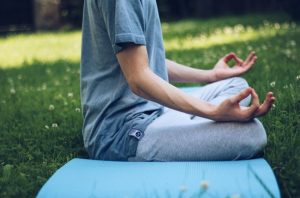Understand Stress Management Techniques for Busy Lives
Stress Management Techniques for Busy Lives In today’s fast-paced world, stress has become an inevitable part of our lives. Whether it’s the demands of work, family responsibilities, or personal goals, it’s easy to feel overwhelmed by the constant pressure. However, finding balance amidst the chaos is essential for our mental and physical well-being. Implementing effective stress management techniques can help us navigate through life’s challenges with greater ease and resilience. Explore More About Health Issues And Their Solutions (Solve Headache Naturally) Here are some strategies to help you find balance and manage stress in your busy life:
🏋️ Exercise
Regular exercise is not only beneficial for physical health but also for mental well-being. Engaging in physical activity releases endorphins, which are natural stress relievers. Whether it’s a brisk walk, a yoga session, or a workout at the gym, incorporating exercise into your routine can help reduce stress levels and improve overall mood.
🥦 Healthy Diet
Eating a nutritious diet plays a crucial role in managing stress. Fueling your body with wholesome foods rich in vitamins, minerals, and antioxidants can provide the energy and nutrients needed to cope with stress. Avoiding excessive caffeine, sugar, and processed foods can help stabilize mood and energy levels, contributing to a greater sense of well-being.

😴 Sleep
Prioritizing adequate sleep is essential for stress management. Quality sleep allows the body to rest and recharge, helping to regulate stress hormones and promote emotional resilience. Establishing a bedtime routine, creating a comfortable sleep environment, and practicing relaxation techniques can improve sleep quality and enhance overall health.
🧘 Yoga
Yoga combines physical postures, breathwork, and mindfulness to promote relaxation and stress relief. Practicing yoga regularly can help reduce muscle tension, calm the mind, and improve flexibility and strength. Whether it’s a gentle flow or a more vigorous practice, incorporating yoga into your routine can foster a sense of balance and tranquility.
🚧 Setting Boundaries
Learning to set boundaries is essential for managing stress in busy lives. Saying no to excessive demands, prioritizing self-care, and establishing healthy limits can prevent burnout and overwhelm. Communicating your needs effectively and respecting your personal boundaries can create a more balanced and fulfilling lifestyle.

🏋️♂️ Going to the Gym
Regular gym sessions offer a dedicated time to focus on physical health and well-being. Whether it’s lifting weights, attending group fitness classes, or using cardio equipment, going to the gym can provide a much-needed break from daily stressors. Exercise releases tension, boosts mood, and enhances overall resilience to stress.
🤝 Seek Support
Don’t hesitate to reach out for support when needed. Whether it’s talking to a friend, family member, or professional counselor, sharing your feelings and experiences can provide perspective and validation. Building a support network of trusted individuals can offer emotional support and practical assistance during challenging times.
🤗 Embrace Stress
While stress is often perceived as negative, embracing stress can lead to personal growth and resilience. Viewing stress as a natural response to life’s challenges can empower you to develop coping strategies and adapt to change more effectively. Embracing stress as a catalyst for growth can foster a mindset of resilience and resourcefulness.

💆 Embrace Self-Care Is a Stress Management Techniques for Busy Lives
Prioritizing self-care is essential for maintaining balance and well-being. Taking time for activities that nourish your body, mind, and soul can recharge your batteries and enhance your ability to cope with stress. Whether it’s indulging in a hobby, practicing mindfulness, or simply relaxing, embracing self-care can rejuvenate your spirit and enhance your quality of life.
🌿 Relaxation Techniques
- Deep breathing exercises: Practice slow, deep breaths to activate the body’s relaxation response.
- Progressive muscle relaxation: Tense and then relax different muscle groups to release tension.
- Guided imagery: Visualize calming scenes or scenarios to promote relaxation.
- Mindfulness meditation: Focus on the present moment with openness and curiosity, without judgment.
- Listening to soothing music: Create a playlist of calming music or nature sounds to unwind.
- Engage in hobbies: Pursue activities that bring joy and relaxation, such as painting, gardening, or reading.
- Practice yoga or tai chi: Gentle movement combined with breathwork can promote relaxation and stress relief.
- Take a warm bath: Soak in a tub with essential oils or bath salts to soothe muscles and calm the mind.
- Spend time in nature: Connect with the outdoors by taking walks, gardening, or simply enjoying the scenery.
- Journaling: Write down your thoughts and feelings to process emotions and gain perspective.
⏸️ Take Breaks
In the midst of a hectic schedule, taking regular breaks is essential for maintaining productivity and well-being. Whether it’s a short walk outdoors, a brief meditation session, or a moment to simply breathe deeply, taking breaks can refresh your mind and body, allowing you to return to tasks with renewed focus and energy.

🎧 Listen to Something Is a Stress Management Techniques for Busy Lives
Listening to soothing music, nature sounds, or guided meditations can have a profound impact on stress levels and mood. Creating a playlist of calming music or podcasts can provide a welcome escape from the hustle and bustle of daily life, promoting relaxation and inner peace.
🚫 Eliminating Stressors
Identifying and eliminating sources of stress in your life can help restore balance and well-being. Whether it’s simplifying your schedule, decluttering your environment, or addressing conflict in relationships, taking proactive steps to reduce stressors can create a more harmonious and fulfilling lifestyle.
🌬️ Breath Focus
Practicing breath focus techniques can help calm the mind and relax the body. Whether it’s deep belly breathing, diaphragmatic breathing, or alternate nostril breathing, focusing on the breath can promote relaxation and reduce stress levels. Incorporating breath focus into your daily routine can cultivate a sense of calm and centeredness amidst life’s challenges.

⏰ Time Management Is a Stress Management Techniques for Busy Lives
Effective time management is crucial for juggling multiple responsibilities and minimizing stress. Prioritizing tasks, setting realistic goals, and scheduling dedicated time for work and leisure activities can help create a sense of order and control. Using tools such as to-do lists, calendars, and time-tracking apps can enhance productivity and reduce overwhelm.
💭 Deep Breathing
Deep breathing exercises are simple yet powerful tools for managing stress. Taking slow, deep breaths through the nose and exhaling slowly through the mouth can activate the body’s relaxation response, lowering heart rate and blood pressure. Incorporating deep breathing into your daily routine can promote calm and resilience in the face of stress.
🧘♂️ Practice Mindfulness
Mindfulness involves paying attention to the present moment with openness and curiosity, without judgment. Practicing mindfulness meditation, mindful eating, or simply bringing awareness to daily activities can cultivate a greater sense of presence and inner peace. Incorporating mindfulness into your life can help reduce stress and enhance overall well-being.

🧘♀️ Meditation
Regular meditation practice can help quiet the mind, reduce stress, and promote emotional balance. Whether it’s mindfulness meditation, loving-kindness meditation, or guided visualization, dedicating time each day to meditation can foster a sense of calm and clarity. Integrating meditation into your routine can enhance resilience and coping skills in the face of life’s challenges.
🎯 SMART Goals Is a Stress Management Techniques for Busy Lives
Setting SMART (Specific, Measurable, Achievable, Relevant, Time-bound) goals can help you stay focused and motivated amidst the demands of daily life. Breaking larger goals into smaller, manageable tasks and tracking progress regularly can increase productivity and reduce stress. Setting SMART goals empowers you to take concrete steps towards your aspirations while maintaining balance and well-being.
🚫 Learn to Say No Is a Stress Management Techniques for Busy Lives
Learning to say no to excessive commitments and obligations is essential for preserving your time and energy. Prioritizing your needs and values, and respectfully declining requests that don’t align with them, can prevent over commitment and burnout. Setting boundaries and saying no when necessary can protect your well-being and promote balance in your life.

🤝 Social Support Is a Stress Management Techniques for Busy Lives
Connecting with others and nurturing relationships can provide invaluable support during stressful times. Whether it’s spending time with loved ones, joining a support group, or seeking professional counseling, social support can buffer the effects of stress and enhance resilience. Cultivating meaningful connections can foster a sense of belonging and emotional well-being.
🚶 Walking Is a Stress Management Techniques for Busy Lives
Taking a leisurely walk outdoors can be a simple yet effective way to reduce stress and improve mood. Spending time in nature, breathing in fresh air, and moving your body can promote relaxation and mental clarity. Incorporating regular walks into your routine can enhance overall well-being and contribute to a more balanced lifestyle.
🤝 Connect with Others for Stress Management Techniques for Busy Lives
Building and maintaining connections with others is essential for emotional well-being and stress management. Whether it’s reaching out to friends, family, or colleagues, or participating in community activities, fostering social connections can provide support, encouragement, and a sense of belonging. Investing in relationships can enhance resilience and promote overall happiness.
Mindfulness Exercises for Relaxation
| Technique | Benefits |
|---|---|
| Exercise | Releases endorphins, reduces stress levels |
| Healthy Diet | Provides energy, stabilizes mood |
| Sleep | Regulates stress hormones, promotes resilience |
| Yoga | Reduces muscle tension, promotes relaxation |
| Setting Boundaries | Prevents burnout, establishes healthy limits |
| Seeking Support | Provides perspective, offers emotional support |
| Embracing Stress | Encourages personal growth, fosters resilience |
| Embracing Self-Care | Rejuvenates spirit, enhances well-being |
| Relaxation Techniques | Promotes calmness, restores balance |
| Taking Breaks | Refreshes mind and body, boosts productivity |
| Listening to Something | Reduces stress levels, promotes relaxation |
| Eliminating Stressors | Reduces overwhelm, fosters harmony |
| Breath Focus | Calms the mind, relaxes the body |
| Time Management | Increases productivity, reduces overwhelm |
| Deep Breathing | Activates relaxation response, lowers BP |
| Practice Mindfulness | Cultivates presence, enhances well-being |
| Meditation | Reduces stress, promotes emotional balance |
| SMART Goals | Increases focus, empowers progress |
| Learn to Say No | Prevents over commitment, preserves energy |
| Social Support | Provides emotional support, enhances resilience |
| Walking | Reduces stress, improves mood |
| Connect with Others | Fosters belonging, promotes happiness |
Final Thoughts
finding balance in a busy life requires intentionality and commitment to self-care. By incorporating these stress management techniques into your daily routine, you can cultivate resilience, enhance well-being, and navigate life’s challenges with greater ease and grace. Remember to prioritize self-care, seek support when needed, and embrace each day with mindfulness and gratitude. Finding balance is not about perfection but rather about finding harmony amidst the chaos of everyday life.
FAQS
How does exercise help manage stress? Regular exercise releases endorphins, natural stress relievers, and reduces the levels of stress hormones in the body, promoting a better mood and overall well-being.
2. Why is setting boundaries important for stress management? Setting boundaries helps prevent burnout and overwhelm by allowing individuals to prioritize self-care and establish healthy limits in their personal and professional lives.
3. What role does mindfulness play in stress management? Practicing mindfulness cultivates awareness of the present moment, reducing rumination and promoting emotional regulation, which can help individuals cope with stress more effectively.
4. How does sleep impact stress levels? Adequate sleep is crucial for regulating stress hormones and promoting emotional resilience. Poor sleep can exacerbate stress levels and impair cognitive function, making it harder to cope with daily challenges.
5. Why is social support beneficial for stress management? Connecting with others provides emotional validation, practical assistance, and a sense of belonging, all of which can help buffer the effects of stress and enhance resilience.
6. What relaxation techniques are effective for stress relief? Deep breathing, progressive muscle relaxation, and guided imagery are all effective relaxation techniques that can promote a sense of calm and reduce stress levels.
7. How can time management help reduce stress? Effective time management helps individuals prioritize tasks, set realistic goals, and create a sense of order and control, reducing feelings of overwhelm and increasing productivity.













